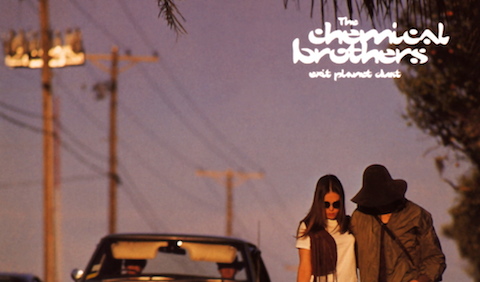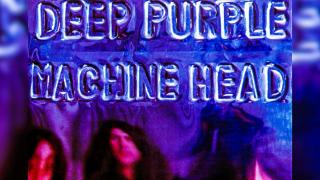Rocking Through the '80s: Top 10 Albums

#10: “Slippery When Wet” (1986)
Bon Jovi These boys from New Jersey had already experimented with AOR and art-rock prior to striking commercial gold with 1986’s “Slippery When Wet.” A songwriting partnership with Desmond Child combined the best elements of Bon Jovi’s already hooky nature with the shiniest elements of the emerging hair metal scene. The results on “Slippery When Wet” proved to be commercial perfection, with songs like “Livin’ on a Prayer,” “You Give Love a Bad Name” and “Wanted Dead or Alive” going on to become certified hits. Beyond this, “Slippery When Wet” also serves as perhaps the perfect Bon Jovi record, a virtual textbook for younger bands that would emerge in their wake.
#9: “Disintegration” (1989)
The Cure The Cure is many different things to many different people. For some, they’re a gothic rock cornerstone. For others, they’re a pop band with a unique look. Both viewpoints are correct, but it’s with “Disintegration” that The Cure was able to please both ends of that spectrum. The album is defiantly dense, moody and layered. There’s an almost impenetrable darkness at play that bears worthwhile fruit for those taking the musical plunge. Elsewhere, “Disintegration” is also full of well-crafted, memorable songs. “Pictures of You” was a hit single, as was “Lovesong,” but these tunes never feel like outliers. Instead, “Disintegration” is like a great musical painting; able to be admired and analyzed in many different ways by anyone who stops by for an appreciation.
#8: “Back in Black” (1980)
Salio Back To Black Amy Winehouse Cover
AC/DC What does a band do when they’ve lost one of the most dynamic frontmen of all time? Australia’s AC/DC could’ve very easily hung up their boots and went home after the untimely demise of Bon Scott in 1980. Instead of doing this, AC/DC decided instead to both mourn and celebrate the loss of Scott by carrying on with an album that forever marks the man’s legacy. “Back in Black” fittingly opens up with the sound of tolling church bells, before new singer Brian Johnson announces his arrival with “Hells Bells.” From that point on, it’s classic AC/DC with a new, inspired edge. The band never looked back, and fans welcomed this new version of the AC/DC with open arms.
#7: “Brothers in Arms” (1985)
Top 10 Chemical Brothers Songs
Dire Straits The massive, worldwide success of Dire Straits has proven that it’s not always the loudest rock band that wins. If anything, 1985’s “Brothers in Arms” succeeds best during its quieter moments, such as on “Your Latest Trick” and the evocative title track. Elsewhere, the huge hit single “Money For Nothing” showcased songwriter Mark Knopfler’s sense of humor and witty lyrics. Make no mistake, however, Dire Straits is all about the guitar work, and Knopfler’s emotive style is on full display here. The man’s bluesy soulfulness is enough to make even the hardest heart to weep, and “Brothers in Arms” represents this statement beautifully.
#6: “Born in the U.S.A.” (1984)
Bruce Springsteen It wasn’t as if The Boss, Bruce Springsteen, had anything to prove back in 1984 when he released “Born in the U.S.A.” The man was already a certified legend in the music industry, pioneering a singer/songwriter career that influenced legions. That said, “Born in the U.S.A.” also perhaps has the distinction of being the most misunderstood album and title track of all time. This was due largely to its release in the midst of the Cold War, as well as during a time of heavy, moralistic Conservatism within the United States. As a result, the title track was often mistakenly seen as pro-American, rather than as the scathing critique it actually is.
#5: “Invisible Touch” (1986)
Genesis Whoever assumed that progressive rock died in the 1970s apparently wasn’t paying attention to the career trajectories of bands like Genesis. The British prog institution managed to pivot wonderfully after the departure of their singer, Peter Gabriel, and it’s “Invisible Touch” that saw Genesis at the height of their pop prowess. The music here is commercially viable while still retaining the musical intricacies that defined early Genesis. Songs like “Land of Confusion” and the title track are catchy, sure, but also smartly composed. Meanwhile, the two-part “Domino” proved that Genesis were still more than capable of pleasing old fans along with the new.
#4: “Purple Rain” (1984)
Top 10 Deep Purple Songs
Prince & the Revolution It’s not every day that a film soundtrack enters the cultural zeitgeist, but then again “Purple Rain” isn’t exactly an average film soundtrack. The album arrived at exactly the right time to capitalize upon Prince’s meteoric rise in popularity and influence. But it wasn’t a foregone conclusion that it would succeed. Fortunately, the songs couldn’t be ignored. The track list reads like a veritable who’s who of Prince classics, including “Let’s Go Crazy,” “I Would Die 4 U,” “When Doves Cry” and the epic title track. “Purple Rain” is an album that’s endured to the modern day, and is worth all of the hype.
#3: “Appetite for Destruction” (1987)
Guns N' Roses There are few rock records released (both then and now) that possess the palpable feeling of danger that permeated “Appetite for Destruction.” Simply said, Guns N' Roses just felt like The Real Deal, street punks that had sharpened their songwriting skills to a fatal knife’s edge. “Appetite for Destruction” isn’t mere mindless aggression, nor reductive posturing. Instead, the album encapsulates everything that defines rock rebellion: a snotty attitude that belies compositional perfection. Axl Rose and crew ensured that everything was note-perfect on “Appetite,” from the riffs and arrangements to a production that was hard-edged, yet full of clarity. This hard rock classic is one for the ages.
#2: “Pyromania” (1983)
Def Leppard It’s a challenge to signal out which album truly defined glam metal’s chart dominance tenure during the 1980s. Whitesnake’s self-titled 1987 album was certainly a commercial smash, as was Def Leppard’s “Hysteria” from that same year. However, we’d argue that 1983’s “Pyromania” offers a better balance of pop influence and Def Lep’s metallic pedigree. “Photograph,” “Foolin’” and “Rock of Ages” are radio staples to this day, yet songs like “Stagefright,” “Die Hard the Hunter” and “Billy’s Got a Gun” are heavy, melodic diamonds. “Pyromania” truly has something for everybody, from memorable hooks to heavy riffs. It’s also an album that showcases Def Leppard firing on all creative cylinders. Before we unveil our top pick, here are a few honorable mentions. “Shout at the Devil” (1983), Mötley Crüe A Stylistic Statement of Intent “1984” (1984), Van Halen A Blueprint for Sunset Strip Glam “The Stone Roses” (1989), The Stone Roses Early, Influential Alt-Rock “Hounds of Love” (1985), Kate Bush Art-Rock with a Generational Vocal Talent “Escape” (1981), Journey Absolute AOR Heaven
#1: “The Joshua Tree” (1987)
Daniel Lanois On Producing U2's The Unforgettable Fire, The Joshua Tree | Potential Future U2 Album?
U2 Rarely has a band been so defined by a single album. “The Joshua Tree” is, for many music fans, the reason why they fell in love with U2. And it’s difficult to argue against that love, since so many of the songs here have rightfully gone on to become classics. “With Or Without You,” “Where the Streets Have No Name” and “I Still Haven’t Found What I’m Looking For” are still played on the radio today. The Edge’s guitar tone and style are still being copied by generations of guitarists seeking his secrets. And Bono remains one of rock’s most iconoclastic frontmen, with a moody and rich voice full of melodic nuance. Said simply: U2’s “The Joshua Tree” helped define the 1980s. Which 1980s album do YOU think helped define the decade? Let us know in the comments!





